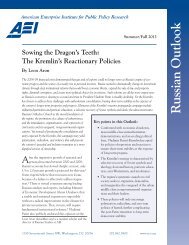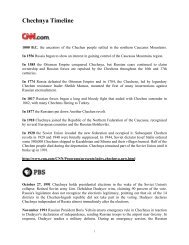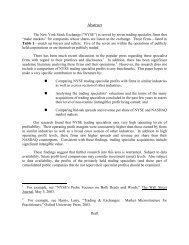Download the PDF - American Enterprise Institute
Download the PDF - American Enterprise Institute
Download the PDF - American Enterprise Institute
Create successful ePaper yourself
Turn your PDF publications into a flip-book with our unique Google optimized e-Paper software.
14 SLAVERY AND THE CONSTITUTIONAL CONVENTION<br />
subversive of <strong>the</strong>ir internal order or to be particularly burdensome<br />
to <strong>the</strong>m. One should attempt in making such a union to minimize<br />
predictable sources of friction among <strong>the</strong> members. The open borders<br />
and <strong>the</strong> contiguousness of slave and free states produced likely<br />
threats to <strong>the</strong> harmony among <strong>the</strong> states.<br />
Moreover, since many of <strong>the</strong> new free states had become quite<br />
hostile to slavery, <strong>the</strong>y might adopt <strong>the</strong> very provocative policy of<br />
declaring that all persons within <strong>the</strong>ir borders are free. Such is <strong>the</strong><br />
prerogative of sovereign states to do—to declare or decide on <strong>the</strong><br />
civil status of people within <strong>the</strong>m. The Fugitive Slave Clause decrees<br />
as a matter of friendship or comity between <strong>the</strong> states that no state<br />
shall have <strong>the</strong> power to do that—that is, to declare escaped slaves<br />
free. That is why this clause is located in <strong>the</strong> part of <strong>the</strong> Constitution<br />
that deals with relations among <strong>the</strong> states. States have a duty<br />
not to become a refuge for fugitive slaves, just as under <strong>the</strong> extradition<br />
clause, <strong>the</strong>y have a duty not to become a refuge for escapees<br />
from justice from o<strong>the</strong>r states.<br />
Moreover, and this is maybe a little more controversial, <strong>the</strong> Fugitive<br />
Slave Clause contains no grant of power to Congress to enforce<br />
it. In my opinion, <strong>the</strong> best reading of this clause is to say that, originally,<br />
<strong>the</strong>y did not intend a congressional power to enforce <strong>the</strong> Fugitive<br />
Slave Clause. The clause imposes a duty on <strong>the</strong> states not to<br />
attempt to change <strong>the</strong> legal status of fugitives, and indeed to “deliver<br />
<strong>the</strong>m up,” but it has no mechanism to enforce this o<strong>the</strong>r than <strong>the</strong><br />
good faith of <strong>the</strong> states.<br />
Here is ano<strong>the</strong>r place where history moved off in a different<br />
direction from what <strong>the</strong> Founders expected. In 1793, Congress<br />
passed a Fugitive Slave Act, which was upheld by <strong>the</strong> Supreme<br />
Court in 1842 in <strong>the</strong> case of Prigg v. Pennsylvania—in my opinion,<br />
wrongly upheld by <strong>the</strong> court. If <strong>the</strong> Fugitive Slave Clause had been<br />
left as originally intended, it would not have been as effective an<br />
instrument for aiding slavery as it turned out to be. But in light of<br />
<strong>the</strong> potentially disruptive results of leaving some of <strong>the</strong> states free to<br />
undermine <strong>the</strong> domestic institutions of o<strong>the</strong>r states, it was easy for<br />
<strong>the</strong> Convention to adopt <strong>the</strong> Fugitive Slave Clause, even without <strong>the</strong><br />
prompting of threats of disunion. But <strong>the</strong> clause is not, I would






